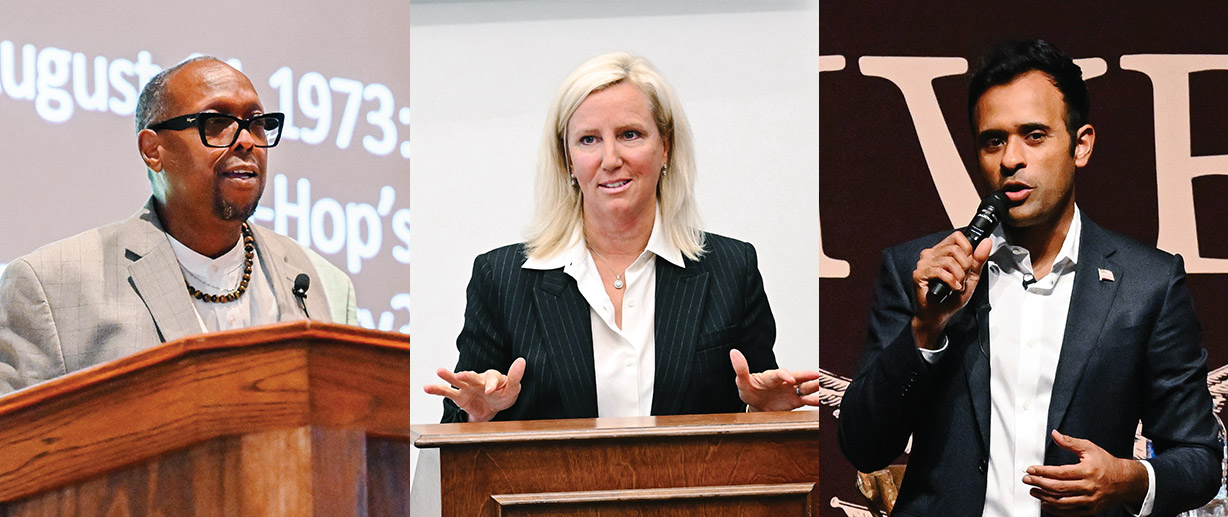From artificial intelligence to zombies, there was a lot to talk about on Wofford’s campus during the fall semester.
Add on hip-hop, national security, the history of gay bars and nonfiction writing, and you’ve got a good sampling of the topics covered so far this year.
Guest speakers from across disciplines and perspectives have long played a key role in Wofford’s mission of providing a superior liberal arts education that prepares students for extraordinary and positive contributions to a global society. Bringing thought leaders to campus allows students to further their understanding of familiar topics, investigate new topics and expand their worldview.
“Talks give us an opportunity, outside of tests or class requirements, to be in the moment and think about an idea,” says Dr. Dwain Pruitt ’95, chief equity officer and vice president for community initiatives. “I intentionally invite speakers who will challenge assumptions and inspire students to think for themselves. Having an authentic human experience discussed onstage is more impactful and powerful than anything you’ll read in a book.”
That’s something Abigail Zagar ’27, a first-year student from Central, South Carolina, appreciates about the opportunities to listen to and engage with the variety of people who speak on campus.
“The more diverse streams of information you’ve been shown, the more paths that you can take,” she says. “Whether you agree or disagree, or if you’re even just figuring out why you disagree, it’s so good to research and know what your true core values are instead of just repeating what you’ve previously been told.”
In September, Pruitt invited Santa Clara University history professor Nancy C. Unger to talk on the history of gay bars in America and their impact on LGBTQ+ rights. Pruitt also invited Dr. Mark Anthony Neal, James B. Duke Distinguished Professor of African and African American Studies and chair of the department at Duke University, to present on the history of hip-hop, marking hip-hop’s 50th anniversary.
In November, Diana Gehlhaus, senior adviser for the Chief Digital and Artificial Intelligence Office, presented on the impact of artificial intelligence on college and work. The month before, Dr. Lucy Swanson of the University of Arizona lectured on the evolution of zombie narratives in the French-speaking Caribbean.
Through the Hipp Series on International Affairs and National Security, Van Hipp ’82 brought Ed McMullen, former U.S. Ambassador to Switzerland, and Republican presidential candidate Vivek Ramaswamy to the campus.
“After attending Vivek Ramaswamy’s lecture, I can now see Wofford’s commitment to having a campus open to different thoughts and perspectives,” says Matt Myers ’27, a first-year student from Rock Hill, South Carolina. “While I may or may not agree with everything that was said at the lecture, I am glad that Wofford gives students the opportunity to hear from thought leaders and political figures, especially someone running for president, which for me reinforces the importance of civil participation and being an active and engaged citizen.”
Pulitzer-nominated author James M. Scott ’97 returned to campus on Oct. 24 to talk about the role of narrative in writing history. He was joined by resident experts John Lane ’77, professor emeritus and author; Dr. Jessica Tompkins, assistant professor of history; and Dr. Clayton Whisnant, professor of history, all of whom are also researchers and writers with a keen interest in the topic.
In addition, U.S. Sen. Cory Booker was on campus for the Spratt Issues Conference sponsored by U.S. Rep. Jim Clyburn and the Democratic Party of South Carolina. The campus also regularly hosts artist talks for exhibit openings, lectures sponsored by academic departments and career-focused speakers through the Career Center.
“It’s important that colleges and universities such as Wofford remain committed to the free exchange of ideas,” says President Nayef Samhat. “This exchange of knowledge and perspective — with civility and respect for the views of all — is the foundation of a transformational liberal arts education. Sometimes the issues debated are those we care deeply about, which means the exchange of ideas can generate great passion, discomfort and even anger, but that’s all the more reason for Wofford to remain committed to academic freedom and the values articulated in the Chicago Principles as well as our own mission and core values.”
